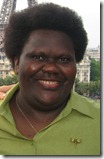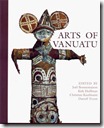Given the unseasonably cold weather, it was a strong turn out at the Institute of Postcolonial Studies for the ‘Silence must be heard’ discussion about Melanesian culture. A large contingent from Papua New Guinea ensured a lively discussion following about the relative benefits of development in the region.
Sana Balai began with a haunting account of her childhood experience in Buka Island listening to waves at night for a sign of the chief’s passing away. She recounted many fascinating incidents she has experienced as a curator at the National Gallery of Victoria, dealing with stories from the region that she knows are not permissible for her to hear.
Kirk Huffman compressed his extraordinary experience working in Vanuatu for nearly 40 years, defending the traditional way of life against development. In one remarkable story, he spoke about the taboo associated with the chief’s voice and the interlocutor who cancelled any accidental hearing of the chief by use of a wooden instrument. He also recounted the Vanuatu traditional view of the ‘world of steel’ represented by Westerners, and the village that refused to speak any more after the white men had captured their words in recording devices.
This event planted the seed for a future symposium that might fully explore the politics of silence in our region. Many questions were raised:
- How does the Western crusade against secrets, such as Wikileaks, engage with societies whose traditions are based on knowledge restrictions?
- Can silence be seen as a positive action, rather than a withholding?
- How does this compare to the place of silence in Western culture, such as ‘the right to remain silent’ and ‘a minute’s silence’ of respect?
- Are there protocols for Westerners who are working with Melanesian societies that builds trust in confidentiality?
- How can knowledge be understood as the protection of secrets as much as spread of information?
There is clearly much more to learn from Melanesian culture. There is now the prospect of a future event where peoples of the region can share the understanding, commitment and sounds of silence.


